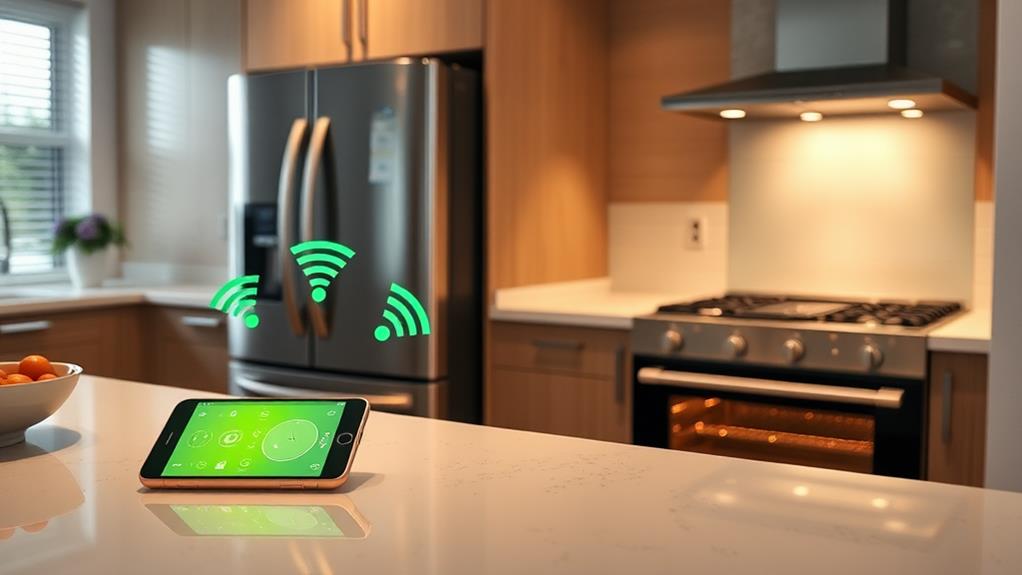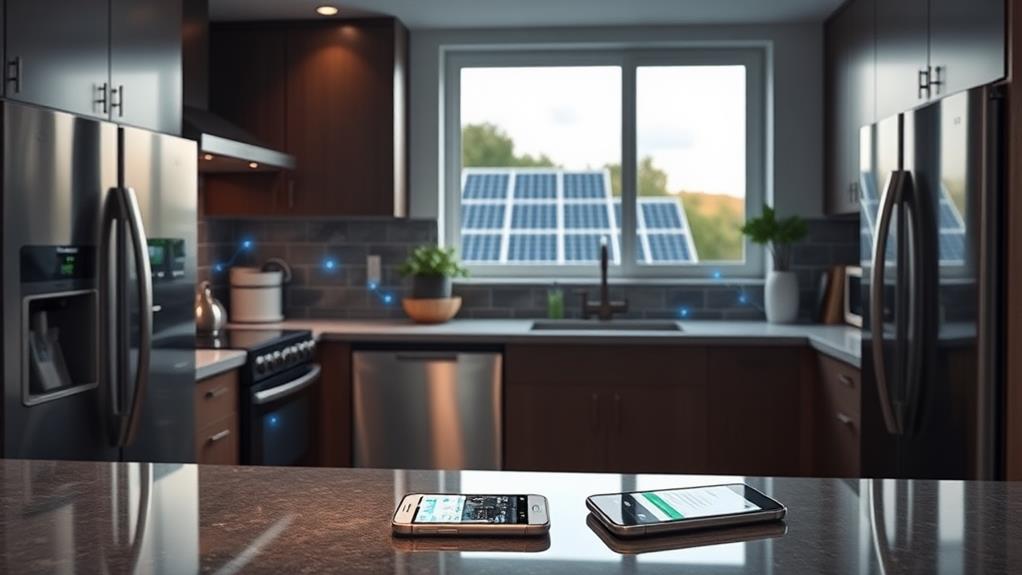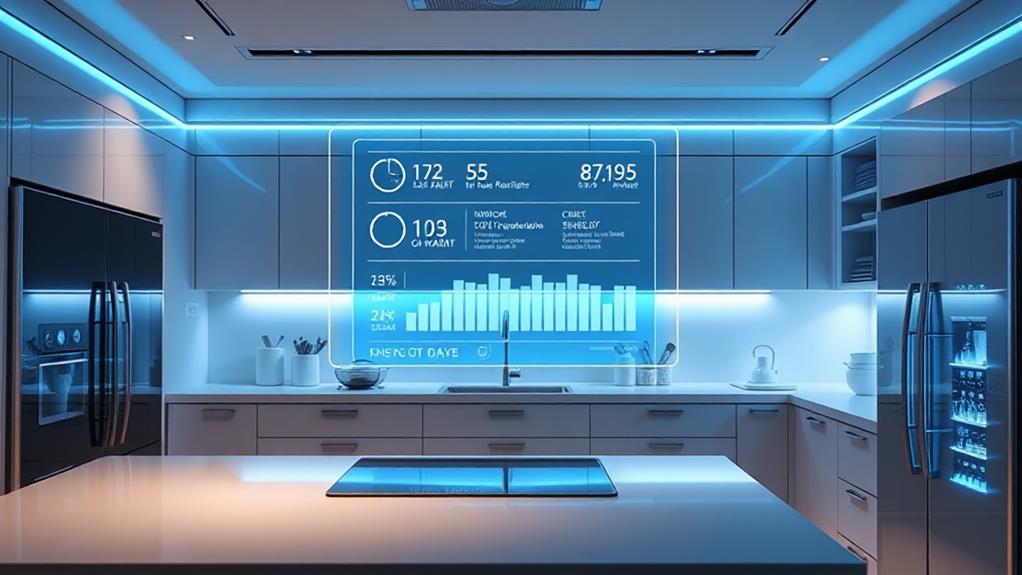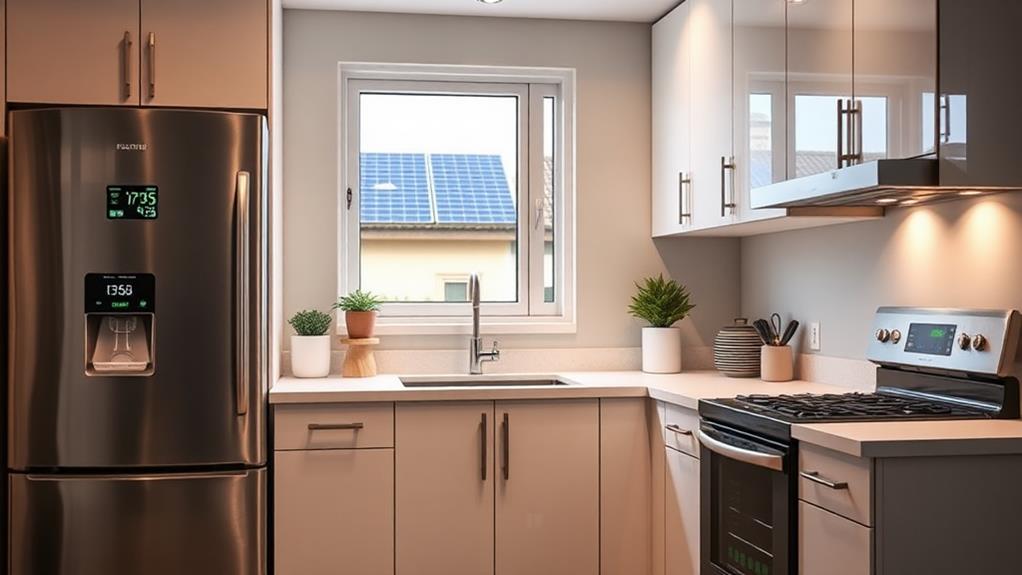Smart appliances are transforming how you manage your home's energy consumption. These devices use advanced sensors, network connectivity, and machine learning to optimize power usage based on your habits and preferences. They communicate with each other and your home's central system, adjusting operations to reduce waste and costs. You'll see immediate savings on your energy bills and contribute to a smaller carbon footprint. Smart appliances can integrate with renewable energy sources and participate in utility company programs for further efficiency. As technology advances, you'll find even more ways these intelligent devices can help you create a smarter, greener home.
Understanding Smart Appliance Technology

As smart appliances become increasingly prevalent in modern homes, it's essential to understand the technology behind them. Smart appliances are equipped with advanced sensors, network connectivity, and microprocessors that allow them to communicate with each other and with your home's central control system. These devices can gather and analyze data about your usage patterns, energy consumption, and environmental conditions.
You'll find that smart appliances use various communication protocols like Wi-Fi, Bluetooth, or Zigbee to connect to your home network and the internet. This connectivity enables remote control and monitoring through smartphone apps or voice assistants. Many smart appliances also feature machine learning capabilities, allowing them to adapt to your preferences and habits over time.
The core of smart appliance technology lies in its ability to optimize energy use. For example, a smart refrigerator can adjust its cooling cycles based on usage patterns, while a smart washing machine can determine the most energy-efficient time to run a load. These appliances often come with energy monitoring features, giving you real-time insights into your consumption and helping you make informed decisions about your energy use.
Energy Optimization Features
In light of the growing demand for energy efficiency, smart appliances come equipped with various energy optimization features. These features allow you to reduce your energy consumption and lower your utility bills.
One key feature is intelligent power management, which automatically adjusts the appliance's energy usage based on your habits and preferences. For example, your smart refrigerator can optimize its cooling cycles during off-peak hours when electricity rates are lower.
Another important feature is real-time energy monitoring. You can track your appliance's energy consumption through smartphone apps or built-in displays, helping you make informed decisions about usage. Many smart appliances also offer eco-modes that prioritize energy savings over maximum performance. You'll find scheduling capabilities that let you set specific times for your appliances to operate, avoiding peak energy periods.
Smart thermostats learn your temperature preferences and occupancy patterns, adjusting heating and cooling accordingly. Some appliances even integrate with renewable energy systems, optimizing their operation to coincide with periods of high solar or wind power generation. By leveraging these energy optimization features, you can significantly reduce your carbon footprint and contribute to a more sustainable future.
Integration With Home Energy Systems

Smart appliance integration with home energy systems marks a significant leap in household efficiency. You'll find that these interconnected devices work in harmony with your home's energy management system, creating a seamless ecosystem that optimizes power consumption. By connecting your smart appliances to a central hub, you're enabling real-time monitoring and control of your energy usage.
Your smart thermostats, for instance, can communicate with your HVAC system to adjust temperatures based on occupancy and weather forecasts. Smart washing machines and dishwashers can be programmed to run during off-peak hours when electricity rates are lower. Your refrigerator can even alert you when it's time to replace the filter or if the door's been left open, preventing energy waste.
Integration also allows for more sophisticated demand response programs. Your utility company can send signals to your smart appliances, encouraging them to reduce power consumption during peak demand periods. This not only helps balance the grid but can also lead to cost savings on your energy bill. With this level of integration, you're taking a proactive approach to energy management, reducing your carbon footprint and improving overall home efficiency.
Cost Savings and Environmental Impact
Dollars and cents drive many household decisions, but smart appliances offer a compelling blend of financial savings and environmental benefits. You'll notice immediate reductions in your energy bills as these devices optimize their power consumption.
Smart refrigerators adjust cooling cycles based on usage patterns, while intelligent washing machines select the most efficient water and energy settings for each load.
Over time, these savings add up significantly. You're not just cutting costs; you're also reducing your carbon footprint. Smart appliances minimize energy waste, directly contributing to lower greenhouse gas emissions. They help you monitor and reduce your home's overall energy consumption, often providing detailed reports on usage patterns and suggestions for improvement.
Many utility companies offer incentives for using smart appliances, further increasing your savings. You'll also benefit from extended appliance lifespans due to optimized usage and predictive maintenance features. By investing in smart appliances, you're making a choice that's good for your wallet and the planet. You're taking an active role in energy conservation while enjoying the convenience and efficiency of cutting-edge technology in your home.
Future Trends in Smart Appliances

As we look ahead, the future of smart appliances is brimming with exciting possibilities. You'll see an increase in AI-powered devices that can learn and adapt to your habits, optimizing energy use without compromising comfort. Expect appliances to communicate seamlessly with each other, creating a truly interconnected home ecosystem.
You'll witness advancements in voice control and natural language processing, making interactions with your smart appliances more intuitive. Imagine asking your refrigerator to suggest recipes based on its contents or instructing your oven to preheat while you're still at the grocery store.
Energy harvesting technologies will become more prevalent, allowing appliances to generate their own power from ambient sources like heat or vibration. This will reduce their reliance on the grid and further improve energy efficiency.
Smart appliances will also play a crucial role in demand response programs, automatically adjusting their energy consumption during peak hours to help balance the grid. You'll see more integration with renewable energy sources, enabling your appliances to prioritize clean energy use when available.
Conclusion
You've seen how smart appliances are revolutionizing energy management. Did you know that homes with smart appliances can reduce their energy consumption by up to 30%? That's a significant impact on both your wallet and the environment. As these technologies continue to evolve, you'll have even more opportunities to optimize your energy use. Embrace smart appliances, and you'll be part of a smarter, greener future for home energy management.

